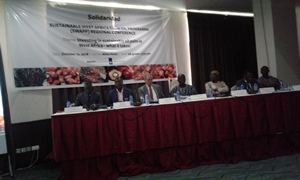
he oil palm sector is to be re-vitalized and transformed to respond to the ever-growing demand for crude palm oil whilst addressing the environmental consequences of the production system.
A Depuy Minister for Food and Agricultrure, Dr Ahmed Yakubu Alhassan, who made this known at a conference on transforming Africa’s palm oil industry in Accra on Wednesday, disclosed that the Ministry of Food and Agriculture (MoFA), had undertaken to collaborate with Solidaridad— a global network of organizations with a focus on stimulating sustainable supply chains through continuous improvements in production and trade relation— to ensure that the Best Management Practices approach to oil palm production at both the farm and mill levels became part of the footprint to reduce Ghana’s Crude Palm Oil (CPO) import bill.
According to Dr Alhassan, MoFA, with the help of its partners at the Ministry of Trade and Industry (MoTI), would also strategize on how to mainstream the best management practices at both the farm and mill levels.
He urged the youth to make good use of the opportunity and venture into the sector to reduce the burden of unemployment while calling on rural banks to support the youth to venture into agriculture by providing them with loan facilities.
He was speaking on the theme: 'Investing in Sustainable Oil Palm in West Africa—What it Takes’.
In an address, the Netherlands Ambassador to Ghana, His Excellency Mr Ron Strikker, disclosed that due to the significant impact made by the first phase of the Sustainable West Africa Palm oil Programme (SWAPP), the government of the Netherlands would continue to sponsor SWAPP in order to fully achieve the target of the project.
Mr Kwasi Ofori-Antwi, Senior Industrial Promotion Officer, MoTI, in his remarks, pledged MoTI’s support towards the implementation of the second phase of SWAPP.
Mr Ofori-Antwi disclosed that a Palm Oil Development Board would be established to facilitate development in the sector in Ghana.
The Chairman for the occasion, Mr Emmanuel Yao Ahiable, was emphatic that the success of the SWAPP initiative meant increased employment.
Mr Ahiable said private sector investment, such as long-term investment by Pension Funds, was critical to the success of the SWAPP initiative.
He stressed the need for Agricultural Extension Officers to support the initiative by making new technologies available to farmers, adding that Ghana should learn from the Cote d’Ivoire experience in palm oil production and development.
Oil palm is the second most important tree crop in the Ghanaian economy after cocoa, with 360,000 hectares of oil palm under cultivation of which 80 per cent are in the hands of smallholders with an average yield of 4 tons/ha/year.
This low yield has been attributed to poor agronomy and limited knowledge on best management practices for oil palm cultivation, with Ghana importing over 100,000 metric tonnes of CPO annually to close the huge demand gap.
Under the programme and with funding from the Dutch Embassy in Ghana, Solidaridad West Africa has, over the past four years, generated data and information, tested and validated innovations as to how the sub-sector can be developed.
SWAPP is implemented in Ghana, Nigeria and Ivory Coast with a focus on increasing the productivity and profitability of the Small to Medium Scale Enterprises in the palm oil sector.
The first phase of the programme, implementation of which began in 2012, ends in the last quarter of 2016 and is expected to be extended from 2017 to 2020.
Since its inception, SWAPP has produced quality palm oil onto the market and also trained more than 2000 farmers across the three West African countries benefiting from the programme.